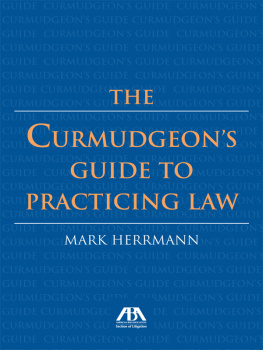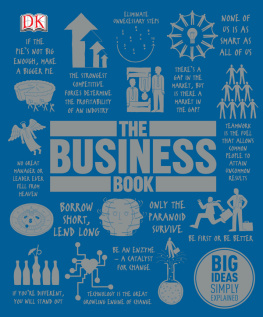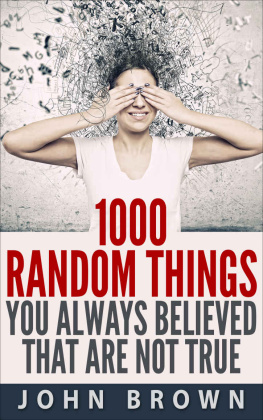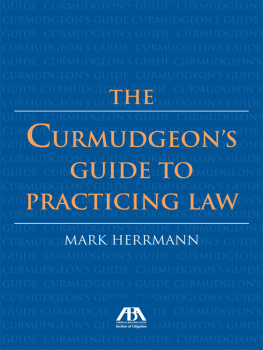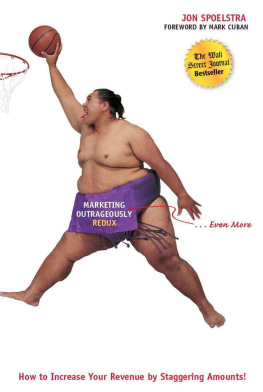Winokur - The Portable curmudgeon redux
Here you can read online Winokur - The Portable curmudgeon redux full text of the book (entire story) in english for free. Download pdf and epub, get meaning, cover and reviews about this ebook. City: New York, year: 1992, publisher: Jon Winokur;Dutton, genre: Detective and thriller. Description of the work, (preface) as well as reviews are available. Best literature library LitArk.com created for fans of good reading and offers a wide selection of genres:
Romance novel
Science fiction
Adventure
Detective
Science
History
Home and family
Prose
Art
Politics
Computer
Non-fiction
Religion
Business
Children
Humor
Choose a favorite category and find really read worthwhile books. Enjoy immersion in the world of imagination, feel the emotions of the characters or learn something new for yourself, make an fascinating discovery.
- Book:The Portable curmudgeon redux
- Author:
- Publisher:Jon Winokur;Dutton
- Genre:
- Year:1992
- City:New York
- Rating:3 / 5
- Favourites:Add to favourites
- Your mark:
- 60
- 1
- 2
- 3
- 4
- 5
The Portable curmudgeon redux: summary, description and annotation
We offer to read an annotation, description, summary or preface (depends on what the author of the book "The Portable curmudgeon redux" wrote himself). If you haven't found the necessary information about the book — write in the comments, we will try to find it.
More than 1000 outrageously irreverent quotations, anecdotes, and interviews on a vast array of subjects, from an illustrious list of world-class curmudgeons
Winokur: author's other books
Who wrote The Portable curmudgeon redux? Find out the surname, the name of the author of the book and a list of all author's works by series.
The Portable curmudgeon redux — read online for free the complete book (whole text) full work
Below is the text of the book, divided by pages. System saving the place of the last page read, allows you to conveniently read the book "The Portable curmudgeon redux" online for free, without having to search again every time where you left off. Put a bookmark, and you can go to the page where you finished reading at any time.
Font size:
Interval:
Bookmark:
by Jon Winokur
Copyright 2011 Jon Winokur
Smashwords Edition
Drawings by Everett Peck
Smashwords Edition License Notes:
This ebook is licensed for your personal enjoymentonly. This ebook may not be re-sold or given away to other people.If you would like to share this book with another person, pleasepurchase an additional copy for each recipient. If youre readingthis book and did not purchase it, or it was not purchased for youruse only, then please return to Smashwords.com and purchase yourown copy. Thank you for respecting the hard work of thisauthor.
cur.mud.geon\,kr-mj-nn [originunknown]
archaic: a crusty, ill-tempered,churlish old man
modern: anyone who hates hypocrisyand pretense and has the temerity to say so; anyone with the habitof pointing out unpleasant facts in an engaging and humorousmanner
TO NOBODY
ACKNOWLEDGMENTS
The following well-meaning persons insisted ontrying to help: Peter Bell, Reid Boates, Norrie Epstein, RonHammes, Nancy Lea Johnson, Howard LeNoble, Anita Nelson, SusanNethery, John Paine, Al Rasof, Susan Rogers, Tobi Sanders, SteveSchuhle, Susan Soriano, Nancy Steele, Linda Takahashi, LawrenceTeacher, Stuart Teacher, LuAnn Walther, Robert Weide of WhyaduckProductions, Bobbie Weiner, Elinor Winokur, and Mark Wolgin.
CONTENTS
H. L. MENCKEN
INTRODUCTION
Dictionaries define curmudgeon as achurlish, irascible fellow; a cantankerous old codger. The originof the word is unknown, but it might come from an old Scottish wordthat meant murmur or mumble, or from the French coeurmechant, evil heart. The archaic definition made it a synonymfor miser, and the word has had recent currency in asomewhat milder connotation, to describe a not entirely unlikablegrouch.
A curmudgeons reputation for malevolence isundeserved. Theyre neither warped nor evil at heart. They donthate mankind, just mankinds excesses. Theyre just as sensitiveand soft-hearted as the next guy, but they hide their vulnerabilitybeneath a crust of misanthropy. They ease the pain by turning hurtinto humor. They snarl at pretense and bite at hypocrisy out of ahealthy sense of outrage. They attack maudlinism because itdevalues genuine sentiment. They hurl polemical thunderbolts atmiddle-class values and pop culture in order to preserve theirsanity. Nature, having failed to equip them with a serviceabledenial mechanism, has endowed them with astute perception and slywit. Offense is their only defense. Their weapons are irony,satire, sarcasm, ridicule. Their targets are pretense, pomposity,conformity, incompetence.
When I was a small boy, my father took me to theStage Delicatessen in New York, having told me beforehand to keepmy eyes open for celebrities. By the time we were seated at adouble table next to a tall, dour man, I had unsuccessfully scannedthe place for Uncle Miltie or Captain Video or even Dagmar.Disappointed, I blurted out, I dont see any celebrities!Our tablemate slowly looked up from his mushroom barley, and withhis patented scowl, Fred Allen did a very, very slow burn in mydirection. It was the dirtiest look Id ever received, but I wasntintimidated. Rather I felt that wed shared a joke, that Id beenhis straight man. He never let on, but I knew he was amused. Myfather introduced me to Mr. Allen, and as he gently shook my handwithout cracking a smile, I felt his unmistakable goodwill behindthe curmudgeons mask.
Curmudgeons are mockers and debunkers whosebitterness is a symptom rather than a disease. They cantcompromise their standards and cant manage the suspension ofdisbelief necessary for feigned cheerfulness. Their awareness is acurse; theyre constantly ticked off because theyre constantlyaware of so much to be ticked off about, and they wish things werebetter.
Maybe curmudgeons have gotten a bad rap in thesame way that the messenger is blamed for the message: They havethe temerity to comment on the human condition without apology.They not only refuse to applaud mediocrity, they howl it down withmorose glee. Their versions of the truth unsettle us, and we holdit against them, even though they soften it with humor.
H. L. Mencken was the quintessential curmudgeon,the one against whom all others must be measured. He wrote thirtybooks and countless essays, columns, and critical reviews. He was alexicographer, reporter, and editor, the literary champion ofSherwood Anderson, Theodore Dreiser, Sinclair Lewis, and EugeneONeill.
Mencken was the scourge of the middle class,which he called the booboisie. In spite of his condescending toneand lack of faith in his fellowman, he was a crusader againstbigotry and injustice. He championed libertarianism and deridedpiety Puritanism is the haunting fear that someone, somewhere, maybe happy, he wrote.
The other great curmudgeons who have contributedto the general sanity of mankindfrom Mark Twain and Ambrose Bierceto G. K. Chesterton and George Bernard Shaw, from Groucho Marx andW. C. Fields to Dave Barry and Lewis Blackhave all had thefacility for pointing out the absurdities of the humancondition.
If there was a Golden Age of curmudgeonry, itwas during the 1920s and 30s at New Yorks Algonquin, an otherwiseundistinguished hotel on West Forty-fourth Street. A dazzling arrayof wits and raconteurs gravitated to the table of AlexanderWoollcott, the New York Times theater critic and bookreviewer, and made it a bastion of urbanity and sparkling repartee.Edmund Wilson dubbed it an all-star literary vaudeville.According to Groucho Marx, The admission fee was a vipers tongueand a half-concealed stiletto. It was a sort of intellectualslaughterhouse. Clare Boothe Luce, no doubt because she was afrequent target of some of its members, was not amused: Youcouldnt say Pass the salt without somebody turning it into a punor trying to top it.
The regulars among the artists, celebrities, andintellectuals who frequented the round table included Franklin P.Adams, Marc Connelly, George S. Kaufman, Harold Ross, HeywoodBroun, Ring Lardner, Robert E. Sherwood, Robert Benchley, andDorothy Parker. Other habitus included Oscar Levant, the MarxBrothers, Tallulah Bankhead, Herman Manckiewicz, Herbert BayardSwope, Edna Ferber, Noel Coward, Charles MacArthur, and S. N.Behrman. As a result, the Algonquin Round Table is the singlegreatest source for the quotations and anecdotes in this book.
The featured curmudgeons in these pages arenot necessarily typical. Indeed, curmudgeons are fierceindividualists by definition. Nevertheless, an examination of thelives of W. C. Fields, Oscar Wilde, George S. Kaufman, RobertBenchley, Oscar Levant, Dorothy Parker, and Groucho Marx, revealscommon threads. Many of them had unhappy childhoods and grew intoneurotic, reclusive, self-centered adults. Many remained shy andinsecure in spite of their celebrity. An inordinate number wereprone to alcoholism, drug addiction, insomnia, hypochondria,misogyny, even suicide.
The contemporary curmudgeons I intervieweddisplayed none of these tendencies. Theyre all intelligent,articulate, and personable. Many are happily married or mated, andthey all appeared healthy and sober when we met. They wereunanimous in their reluctance to characterize themselves ascurmudgeons without the proviso that anybody who isnt acurmudgeon nowadays is just not paying attention. They wereinvariably forthcoming and responsive to my questions, bothpertinent and impertinent. Im grateful to all of them for theirun-curmudgeonly cooperation.
You dont have to be a curmudgeon to make acurmudgeonly statement, so quotes from non- and quasi-curmudgeonsare included hereinapparently even the terminally Pollyannaish canhave flashes of clarity. But the majority of the quotes in thesepages are from the world-class curmudgeons listed herein.
Font size:
Interval:
Bookmark:
Similar books «The Portable curmudgeon redux»
Look at similar books to The Portable curmudgeon redux. We have selected literature similar in name and meaning in the hope of providing readers with more options to find new, interesting, not yet read works.
Discussion, reviews of the book The Portable curmudgeon redux and just readers' own opinions. Leave your comments, write what you think about the work, its meaning or the main characters. Specify what exactly you liked and what you didn't like, and why you think so.






